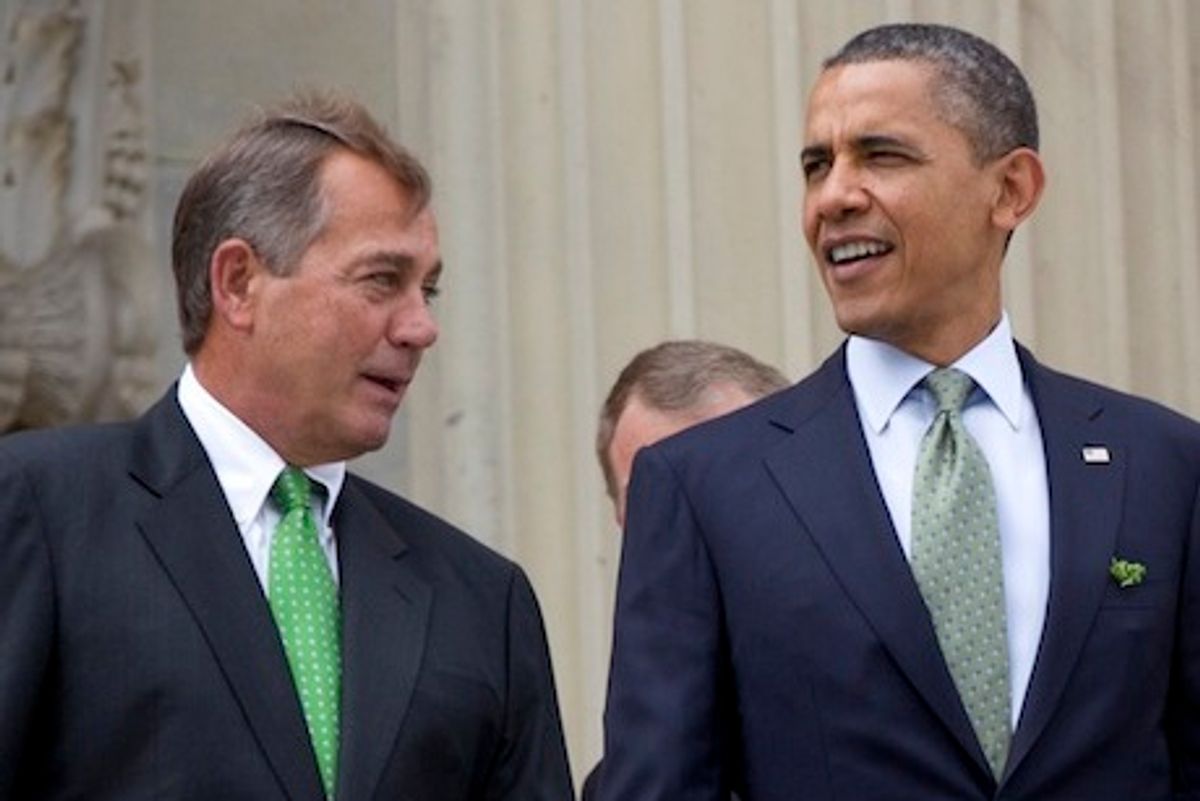I wish President Obama and the Democrats would explain to the nation that the federal budget deficit isn’t the nation’s major economic problem and deficit reduction shouldn’t be our major goal. Our problem is lack of good jobs and sufficient growth, and our goal must be to revive both.
Deficit reduction leads us in the opposite direction — away from jobs and growth. The reason the “fiscal cliff” is dangerous (and, yes, I know – it’s not really a “cliff” but more like a hill) is because it’s too much deficit reduction, too quickly. It would suck too much demand out of the economy.
But more jobs and growth will help reduce the deficit. With more jobs and faster growth, the deficit will shrink as a proportion of the overall economy. Recall the 1990s when the Clinton administration balanced the budget ahead of the schedule it had set with Congress because of faster job growth than anyone expected — bringing in more tax revenues than anyone had forecast. Europe offers the same lesson in reverse: Their deficits are ballooning because their austerity policies have caused their economies to sink.
The best way to generate jobs and growth is for the government to spend more, not less. And for taxes to stay low – or become even lower – on the middle class.
(Higher taxes on the rich won’t slow the economy because the rich will keep spending anyway. After all, being rich means spending whatever you want to spend. By the same token, higher taxes won’t reduce their incentive to save and invest because they’re already doing as much saving and investing as they want. Remember: they’re taking home a near record share of the nation’s total income and have a record share of total wealth.)
Why don’t our politicians and media get this? Because an entire deficit-cutting political industry has grown up in recent years – starting with Ross Perot’s third party in the 1992 election, extending through Peter Petersen’s Institute and other think-tanks funded by Wall Street and big business, embracing the eat-your-spinach deficit hawk crowd in the Democratic Party, and culminating in the Simpson-Bowles Commission that President Obama created in order to appease the hawks but which only legitimized them further.
Most of the media have bought into the narrative that our economic problems stem from an out-of-control budget deficit. They’re repeating this hokum even now, when we’re staring at a fiscal cliff that illustrates just how dangerous deficit reduction can be.
Deficit hawks routinely warn unless the deficit is trimmed we’ll fall prey to inflation and rising interest rates. But there’s no sign of inflation anywhere. The world is awash in underutilized capacity As for interest rates, the yield on the ten-year Treasury bill is now around 1.26 percent – lower than it’s been in living memory.
In fact, if there was ever a time for America to borrow more in order to put our people back to work repairing our crumbling infrastructure and rebuilding our schools, it’s now.
Public investments that spur future job-growth and productivity shouldn’t even be included in measures of government spending to begin with. They’re justifiable as long as the return on those investments – a more educated and productive workforce, and a more efficient infrastructure, both generating more and better goods and services with fewer scarce resources – is higher than the cost of those investments.
In fact, we’d be nuts not to make these investments under these circumstances. No sane family equates spending on vacations with investing in their kids’ education. Yet that’s what we do in our federal budget.
Finally, the biggest driver of future deficits is overstated — rising health-care costs that underlie projections for Medicare and Medicaid spending. The rate of growth of health-care costs is slowing because of the Affordable Care Act and increasing pressures on health providers to hold down costs. Yet projections of future budget deficits haven’t yet factored in this slowdown.
So can we please stop obsessing about future budget deficits? They’re distracting our attention from what we should be obsessing about — jobs and growth.



Shares